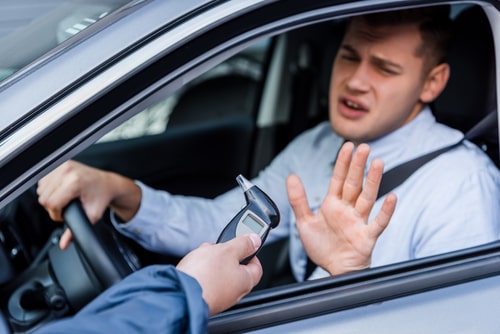Recent Blog Posts
What You Need to Know About Reckless Homicide
 Not to be confused with criminal negligence, reckless homicide involves the “reckless behavior” of an individual which results in the death of another person. Most states place reckless homicide on the same level as involuntary manslaughter. In Illinois, reckless homicide is sometimes referred to as vehicular homicide and can often be difficult to prove in a court of law. Defendants needing assistance in their case would do well to consult with a criminal defense attorney experienced in reckless homicide charges.
Not to be confused with criminal negligence, reckless homicide involves the “reckless behavior” of an individual which results in the death of another person. Most states place reckless homicide on the same level as involuntary manslaughter. In Illinois, reckless homicide is sometimes referred to as vehicular homicide and can often be difficult to prove in a court of law. Defendants needing assistance in their case would do well to consult with a criminal defense attorney experienced in reckless homicide charges.
What is Criminal Negligence?
A criminally negligent act involves an individual behaving outside of the standard for a reasonable person when it comes to caring about the impending results of their actions, but not in a reckless way. To simplify the difference between criminal negligence and reckless homicide, criminal negligent actors do not know that their actions could result in another person losing their life, whereas someone acting recklessly would.
Can I Still Get in Trouble for Marijuana in Illinois?
 Marijuana is officially legal in Illinois, and individuals can purchase it from a licensed dispensary as long as they can show a valid photo ID. However, there are still ways that possessing or smoking marijuana can still get you into trouble with the law. When facing possession charges for drugs, it is important to contact a criminal defense attorney immediately. Remaining proactive can help your attorney formulate a solid defense to any charges being levied against you.
Marijuana is officially legal in Illinois, and individuals can purchase it from a licensed dispensary as long as they can show a valid photo ID. However, there are still ways that possessing or smoking marijuana can still get you into trouble with the law. When facing possession charges for drugs, it is important to contact a criminal defense attorney immediately. Remaining proactive can help your attorney formulate a solid defense to any charges being levied against you.
How Much is Too Much?
In Illinois, it is legal to possess marijuana in quantities of 30 grams or less. Individuals carrying this volume will receive no penalties for marijuana or cannabinoid possession. Individuals in possession of marijuana in volumes between 30 and 100 grams can be charged with a misdemeanor, which carries a fine of up to $2,500 and a possible one-year stint in prison. Repeat offenders or possession of quantities larger than 100 grams can be charged with a felony offense, facing jail time of three to five years with a possible $25,000 in fines.
Facing Date Rape Allegations in Illinois
 Sexual misconduct allegations for “date rape” carry with them severe consequences on more than just a legal level. False allegations of this kind can create a ripple effect throughout many aspects of your life, causing immense harm and crippling its potential. You will want to secure yourself a skilled lawyer experienced in defending clients against sex crime charges to help keep your head above water throughout the entire ordeal.
Sexual misconduct allegations for “date rape” carry with them severe consequences on more than just a legal level. False allegations of this kind can create a ripple effect throughout many aspects of your life, causing immense harm and crippling its potential. You will want to secure yourself a skilled lawyer experienced in defending clients against sex crime charges to help keep your head above water throughout the entire ordeal.
What is “Date Rape”?
When one person or party sexually assaults another person or party with penetration, that is considered rape. Date rape often occurs in a social situation where the two parties are engaged in a romantic relationship or date, and one party forces or coerces the other into sexual penetration. Date rape, or acquaintance rape, can often involve drugs or alcohol.
How Does a Hate Crime Affect Assault Charges?
 When a person commits a crime against another person or group based on their gender, race, religion, or sexual orientation, that is considered a hate crime. Hate crimes can be both non-violent and violent. Stalking and harassment can be just as much a hate crime as theft or assault. The difficulty is proving whether a crime is hateful or just a crime. A skilled defense attorney can help protect your rights and defend you in court if you are accused of a hate crime.
When a person commits a crime against another person or group based on their gender, race, religion, or sexual orientation, that is considered a hate crime. Hate crimes can be both non-violent and violent. Stalking and harassment can be just as much a hate crime as theft or assault. The difficulty is proving whether a crime is hateful or just a crime. A skilled defense attorney can help protect your rights and defend you in court if you are accused of a hate crime.
Proving a Hate Crime
A prosecutor must convince the judge or jury that the crime they committed also carried with it hateful intent. In this case, hateful means the crime was carried out specifically to target a person or group based on race, gender, creed, religion, political affiliation, or any other bias under Illinois hate crime law. Intent is the key factor when determining a hate crime offense. As not every crime against a member of the LGBTQ or a racial minority is a hate crime, it is up to the prosecutor to prove beyond a reasonable doubt the defendant's intention.
The Role of Field Sobriety Tests in Illinois DUI Arrests
 When an officer pulls you over under suspicion of driving under the influence (DUI) they may request you to take a field sobriety test. A field sobriety test may consist of blowing into a breathalyzer or an array of physical feats such as walking a straight line and turning or standing on one leg. Individuals facing DUI charges should consult a criminal defense attorney as soon as possible. They can defend you against these charges and fight to get them reduced or thrown out.
When an officer pulls you over under suspicion of driving under the influence (DUI) they may request you to take a field sobriety test. A field sobriety test may consist of blowing into a breathalyzer or an array of physical feats such as walking a straight line and turning or standing on one leg. Individuals facing DUI charges should consult a criminal defense attorney as soon as possible. They can defend you against these charges and fight to get them reduced or thrown out.
Am I Legally Required to Take a Field Sobriety Test?
The short answer is no. You are not legally obligated to entertain a field sobriety test when an officer pulls you over. However, it is Illinois law that anyone who gets behind the wheel of a motor vehicle has given implied consent to testing. This means that refusal of a field sobriety test where you are found guilty of DUI charges will result in much stiffer penalties than had you initially obliged the officer. Though, if you are 100 percent confident in your ability to pass the test, it is in your best interest to take it. If you know that you will fail it, it can be a smarter choice not to take the test or else wind up facing multiple charges later in court.
How to Choose the Right Criminal Defense Attorney in Illinois
 The outcome of your criminal defense case can depend on the quality of who you choose to defend you. Selecting the right attorney is almost as important as winning the case outright. No matter what you are being accused of, be it drug charges, sex offenses, or violent crimes, a good lawyer can be the difference between walking away or going away for a long time.
The outcome of your criminal defense case can depend on the quality of who you choose to defend you. Selecting the right attorney is almost as important as winning the case outright. No matter what you are being accused of, be it drug charges, sex offenses, or violent crimes, a good lawyer can be the difference between walking away or going away for a long time.
Do They Have a Good Reputation?
Choose an attorney who is respected. An attorney with a good reputation should have references or testimonials from past clients to back it up. Do your research within the legal community to vet an attorney before taking them on as your legal counsel. Use the Illinois State Bar Association to see if the attorney has any disciplinary history.
They Should Be Focused On Criminal Law
A criminal defense attorney should be focused on criminal law above all else. The attorney should be licensed to practice Illinois law. They should be knowledgeable about the criminal charges you are facing and be able to legally defend you against them. You can verify an attorney's license status on the Illinois State Bar Association website.
Avoid Haunting a Jail Cell on Halloween
 Halloween season is upon us, and that usually means more than ghosts and ghouls are engaged in things they probably should not be doing. Driving under the influence (DUI), property crimes, disorderly conduct, and more can turn your trick or treat celebration into a nightmare. Avoid the outcomes of these crimes by properly planning ahead.
Halloween season is upon us, and that usually means more than ghosts and ghouls are engaged in things they probably should not be doing. Driving under the influence (DUI), property crimes, disorderly conduct, and more can turn your trick or treat celebration into a nightmare. Avoid the outcomes of these crimes by properly planning ahead.
As Halloween approaches, it is a great idea to have a reliable and skilled attorney on speed dial, one with enough experience defending individuals accused of the common criminal occurrences that happen around this time of year.
Driving Under the Influence (DUI)
Drunk driving is a common crime committed around most holidays, not just Halloween. When there are festive parties available, the drinks are sure to flow. It creates a perfect disaster that ultimately involves getting behind the wheel and attempting to drive yourself home.
The Legal Consequences of Refusing Breathalyzer Tests in Illinois
 A police officer who suspects you to have been driving under the influence (DUI) of alcohol can pull you over and request a breathalyzer test. Illinois law considers driving a privilege, and as such, once you are behind the wheel of a vehicle you are giving implied consent to being tested.
A police officer who suspects you to have been driving under the influence (DUI) of alcohol can pull you over and request a breathalyzer test. Illinois law considers driving a privilege, and as such, once you are behind the wheel of a vehicle you are giving implied consent to being tested.
Refusal of a breathalyzer test can result in serious legal consequences even if you have not been drinking at all. For this reason, it is important to hire legal representation to help fight any charges you might be facing.
Implied Consent
Illinois is an "implied consent" state, which means that all drivers who operate a motor vehicle in the state are deemed to have consented to chemical testing of their blood alcohol content (BAC) upon request by a law enforcement officer. This means that if you are pulled over and asked to take a breathalyzer test, you are legally required to do so.
Understanding the Age of Consent Laws in Illinois
 Illinois is one of eight states where the legal age of consent for sexual contact is 17 years old. Anyone who engages in sexual activity with a partner under the age of consent is breaking the law and can be charged with crimes ranging from a misdemeanor to a felony. This includes minors with adults as well as minors with other minors.
Illinois is one of eight states where the legal age of consent for sexual contact is 17 years old. Anyone who engages in sexual activity with a partner under the age of consent is breaking the law and can be charged with crimes ranging from a misdemeanor to a felony. This includes minors with adults as well as minors with other minors.
Are you being accused of criminal sexual abuse or assault? Then it is in your best interest to speak to a lawyer immediately. These are serious crimes with serious penalties, and you need someone on your side to protect your rights.
Are There Close-In-Age Exemptions in Illinois?
Close-in-age exemptions, often referred to as “Romeo and Juliet laws'' do not exist in Illinois' Age of Consent law. In Illinois, Individuals who engage in sexual activity with someone under the age of consent can face legal prosecution, regardless of their age or the age of their partner. Even if two people are both under the age of consent, they can still be subject to statutory rape charges. This is because the law recognizes that minors are not always able to give truly informed consent to sexual activity.
The Importance of Legal Representation in Sex Crime Cases
 Sex crime cases are some of the most serious and sensitive cases that can be prosecuted. The accused faces the possibility of long prison sentences, registration as a sex offender, and other lifelong consequences.
Sex crime cases are some of the most serious and sensitive cases that can be prosecuted. The accused faces the possibility of long prison sentences, registration as a sex offender, and other lifelong consequences.
It is important to have experienced legal representation in these cases to protect your rights and interests. The sooner you get legal representation, the better your chances of a positive outcome.
A criminal defense attorney in Illinois can help you in many ways in a sex crime case. They can:
-
Investigate the case and gather evidence to support your defense
-
Negotiate with the prosecutor to try to get a reduced charge or a plea deal
-
Represent you in court and cross-examine witnesses
-
Appeal the case if you are convicted














